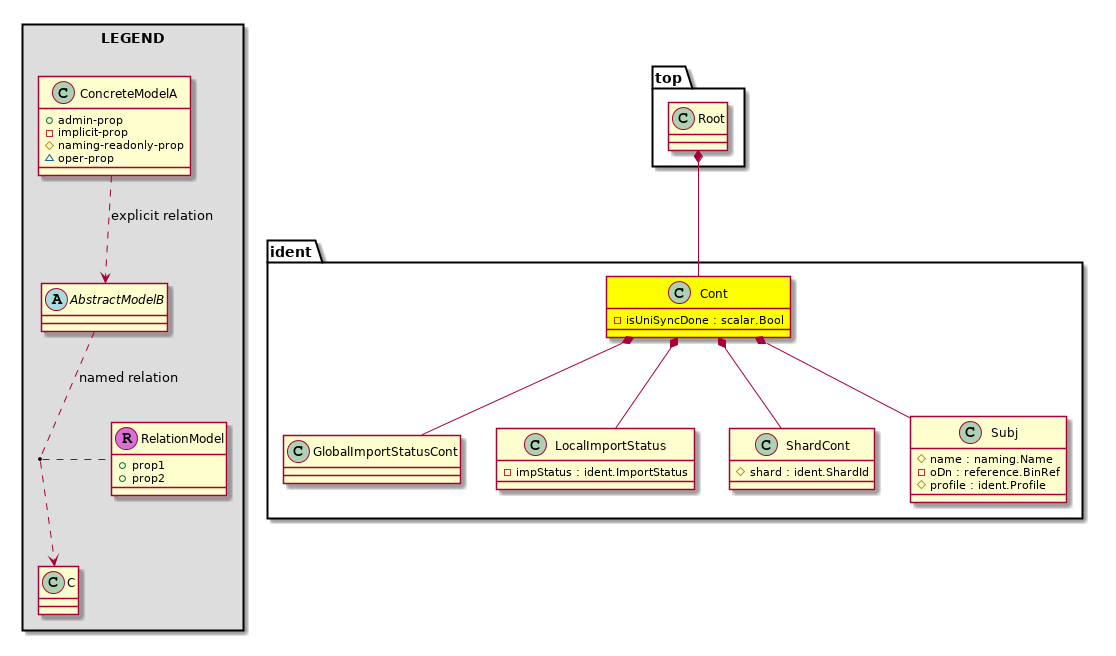![[V]](styles/eye.gif) |
ident:Cont The identity container contains action subjects. |
├
|
![[V]](styles/eye.gif) |
fault:Counts An immutable object that provides the number of critical, major, minor, and warning faults raised on its parent object and its subtree. |
├
|
![[V]](styles/eye.gif) |
health:Inst A base class for a health score instance.(Switch only) |
├
|
![[V]](styles/eye.gif) |
ident:ShardCont Shard Container: Container used to bulk multiple Ids allocation
requests into a task.
Each ShardCont contains all the Ids that need to be requested from one
particular Shard. The children of ShardCont hold the reqSubjDn which forms
the reference to get the Ids to be allocated.
|
|
├
|
![[V]](styles/eye.gif) |
fault:Counts An immutable object that provides the number of critical, major, minor, and warning faults raised on its parent object and its subtree. |
|
├
|
![[V]](styles/eye.gif) |
fault:Delegate Exposes internal faults to the user. A fault delegate object can be defined on IFC (for example, for an endpoint group) and when the fault is raised
(for example, under an endpoint policy on a switch), a fault delegate object is created on IFC under the specified object. A fault delegate object follows the lifecycle of the original fault instance object, being created, modified, or deleted based on the changes of the original fault. |
|
├
|
![[V]](styles/eye.gif) |
health:Inst A base class for a health score instance.(Switch only) |
|
|
├
|
![[V]](styles/eye.gif) |
fault:Counts An immutable object that provides the number of critical, major, minor, and warning faults raised on its parent object and its subtree. |
|
|
├
|
![[V]](styles/eye.gif) |
fault:Delegate Exposes internal faults to the user. A fault delegate object can be defined on IFC (for example, for an endpoint group) and when the fault is raised
(for example, under an endpoint policy on a switch), a fault delegate object is created on IFC under the specified object. A fault delegate object follows the lifecycle of the original fault instance object, being created, modified, or deleted based on the changes of the original fault. |
|
|
├
|
![[V]](styles/eye.gif) |
fault:Inst Contains detailed information of a fault. This object is attached as a child of the object on which the fault condition occurred. One instance object is created for each fault
condition of the parent object. A fault instance object is identified by a fault code. |
|
|
|
├
|
![[V]](styles/eye.gif) |
aaa:RbacAnnotation RbacAnnotation is used for capturing rbac properties of any apic object
Objects can append rbacannotations as Object->RbacAnnotation which
is then checked for domain eligibility |
|
|
├
|
![[V]](styles/eye.gif) |
health:Inst A base class for a health score instance.(Switch only) |
|
|
├
|
![[V]](styles/eye.gif) |
ident:Block The base class for the ID block subclasses must have the From and To properties defined. |
|
|
|
├
|
![[V]](styles/eye.gif) |
fault:Delegate Exposes internal faults to the user. A fault delegate object can be defined on IFC (for example, for an endpoint group) and when the fault is raised
(for example, under an endpoint policy on a switch), a fault delegate object is created on IFC under the specified object. A fault delegate object follows the lifecycle of the original fault instance object, being created, modified, or deleted based on the changes of the original fault. |
|
|
|
├
|
![[V]](styles/eye.gif) |
ident:Segment The base class for ID segment subclasses must define FROM, TO, and LASTASSIGNED properties. These properties must be mod create. |
|

